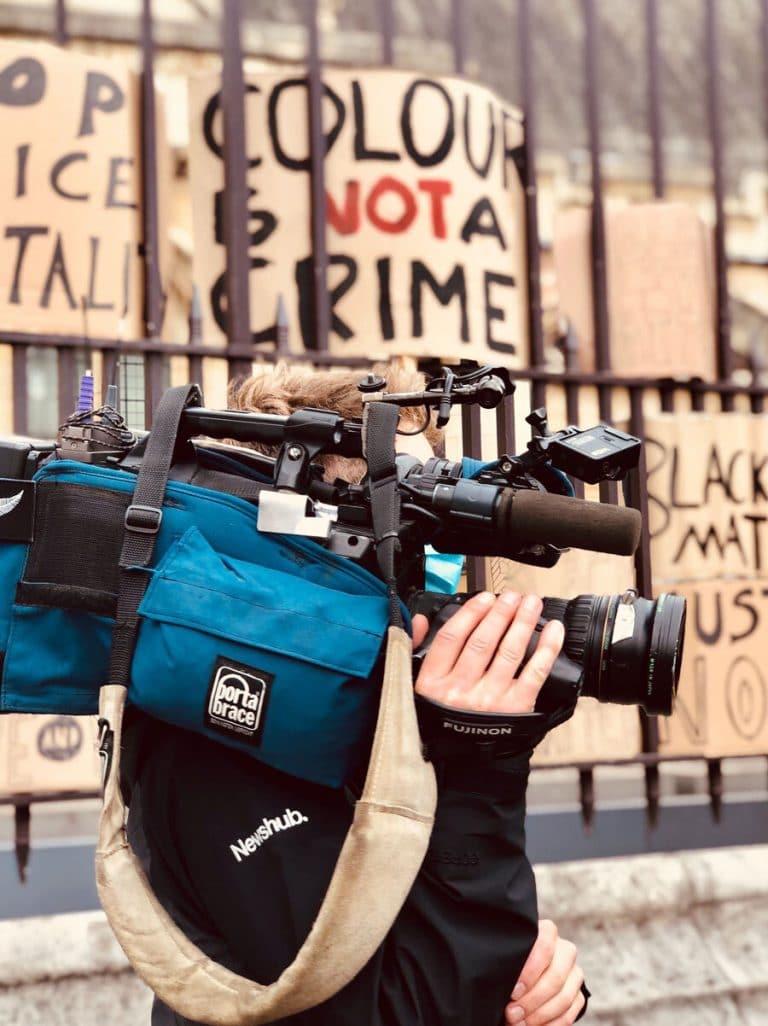
Opinion
In the Philippines, journalism is at risk of being cancelled. What about freedom of the press?
By Camay Abraham
Opinion
In the Philippines, journalism is at risk of being cancelled. What about freedom of the press?
By Camay Abraham
Updated Sep 17, 2020 at 04:30 PM
Reading time: 3 minutes
Human rights
Aug 20, 2020
As bits of our freedoms are torn down from the pandemic’s lockdown to the protests against injustice and racism, we have turned to our screens to see what’s happening in the world. Journalists have helped become our eyes and ears at the frontlines as sadly seen with CNN’s Oscar Jimenez, who was arrested on live TV while reporting at a Black Lives Matter protest in Minneapolis or Australian reporter Amelia Brace who was attacked by US police at a protest in Washington. Here’s why journalism is seriously at risk of being cancelled.
The US is not the only country turning on journalists. In February 2020, the president of the Philippines, Rodrigo Duterte, passed the anti-terror bill, which states it will use online surveillance to target suspected terrorists. However, this bill creates a loophole, it also allows the government to legally arrest anyone for criticising or opposing the country’s administration or Duterte, and be arrested as a “suspected terrorist.”
The government of the Philippines can detain and charge suspects for up to 24 days or even imprison them for life without parole. Case in point, Maria Ressa, a Filipino-American investigative journalist who wasTime’s Person of the Year in 2018 and CEO of Rappler, a political news site in the Philippines. She was arrested allegedly for tax evasion and cyber-libel crimes. In reality, Ressa was arrested for being a competent journalist and doing her job perhaps too well.
NPR and international lawyer Amal Clooney, who is on the team representing Ressa, told The Washington Post that this bill is extremely dangerous as it can give other world leaders the idea to do the same in their own countries and gives the message to other journalists to “keep quiet or you’ll be next.”
A new documentary by Filipino-American filmmaker Ramona S. Diaz titled A Thousand Cuts covers Ressa’s arrest and the global discussion of censorship it created. It highlights the fact that what’s happening in the Philippines could easily spill over to other countries like the US who are friendly with the Philippines. The public has already seen acts of censorship on what’s really going on in countries such as Hong Kong, the US, the UK and the documentary’s trailer succinctly summarised why we need to pay attention.
But this isn’t a story about just the Philippines; it is a global story on how to protect journalists and other western democracies. With social injustice happening all over the world, freedom of press is also under attack and is slowly being extended to online media platforms. So what could happen if our digital world was taken over by online censorship?
Whether it’s BBC journalists attending protests or sharing TikTok videos showing recordings of first-hand brutality. A censored press would erase peace movements altogether, marginalised communities would continue to be mistreated without anyone knowing about it, and the rich, powerful, and corrupted would continue to take advantage of the people.
We are at a crucial point, not just in the history of our respective countries, but as a global community. As said by Ressa in her Princeton graduation speech, this is an opportunity to build what you envision for the future. This might sound like an idealistic sentiment but it’s simply the truth. If we don’t do anything now then we’ve already lost.
So what can we do? Taking a cue from Ressa who is currently awaiting trial and advises people to be prepared, to do their research and to think of a Plan B in the worst-case scenario.
As journalists are taking the brunt of this online censorship, we need to do our part by helping them spread facts—true facts. Try this old-school journalist trick, and pause for seven seconds before reposting that Instagram post or video. Think beforehand and decide if the information is accurate, and what repercussions it may cause to the local community. Ask yourself, who is behind the news you want to post about or repost?
It’s okay to be afraid. Speak your mind, share your thoughts with others, open a dialogue where you also make the effort of listening to what other people have to say; build a community. Educate yourself, and support younger generations, as this is probably their first time facing information overload and fake news. We must learn how to identify, discern, and judge what is real and what isn’t.
Could a government’s interference cancel journalism for good? While most of us don’t think so, it’s definitely a test to see how far we are willing to go to protect our freedom of speech. Don’t be scared to do the right thing and as eloquently surmised by Maria Ressa, “Don’t shut up.”




